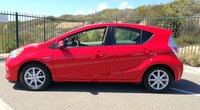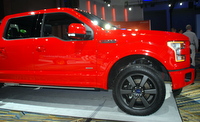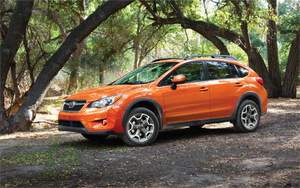ACEE Organization Picks “Greenest” and “Meanest” Cars
Every year the environmental watchdogs at the ACEEE (American Council for an Energy Efficiency Economy) crunch numbers to come up with their “greenest” cars (along with a mirror image “meanest” list for those on the other end of the scale). As has happened on past lists, the results are a grab bag of different technologies, reflecting the varied criteria the group uses to rate cars. This year ACEEE tweaked their methodology a bit and we’ll discuss that at the end. But first, here’s the list (which ends up being more than 10 vehicles for a variety of reasons). We’ve added links to our own road tests and news stories on these vehicles.
- Smart Fortwo ED – Electric – Convertible and coupe versions
- Chevrolet Spark EV – Electric
- Fiat 500e – Electric
- Toyota Prius c – Hybrid – 1.5-liter gas engine with CVT

The smallest Prius can sneak into your heart - Nissan Leaf – Electric
- Toyota Prius Plug-In Hybrid – Plug-in Hybrid – 1.8-liter gas engine with CVT
- Lexus CT 200h – Hybrid – 1.8-liter gas engine with CVT
- Honda Civic Hybrid – Hybrid – 1.5-liter gas engine with CVT
- Honda Civic Natural Gas – Natural Gas – 1.8-liter natural gas engine
- Mitsubishi Mirage Conventional – 1.2-liter gas engine with CVT
- Toyota Prius Hybrid – 1.8-liter gas engine with CVT
- Volkswagen Jetta Hybrid – Hybrid – 1.4-liter gas engine
- Smart Fortwo Conventional – 1.0-liter gas engine; convertible/coupe
That’s ACEEE’s list of the best, which were separated by only eight points on their 100-point scale (these models scored between 53 and 61). Note that the best any car could do on ACEEE’s tough evaluation would be a failing grade in most classes. I guess we can conclude they’re not impressed with how the choices in the automotive world stand up to their imaginary ideal.
Only small cars need apply?
The other conclusion we can make is that, in this group’s eyes and measurements, smaller is better. Half the cars on the list are subcompacts or smaller. Even though the Prius is rated as a midsize, that ranking comes mainly from its liftback configuration as the functional interior space for passengers is closer to a compact. This size car has gained popularity in recent years, but the most popular cars in the country remain midsize models.
To be fair, ACEEE also ranks the top finisher in each category of vehicles. That list of greener choices include:
- Subcompact Honda Fit (gas version)
- Subcompact Chevy Spark (gas version)
- Small Wagon Ford C-Max Hybrid
- AWD Subaru XV Crosstrek Hybrid
- Small SUV Chevy Trax
- Midsize Pickup Chevy Colorado/GMC Canyon
- Minivan Nissan Quest
- Full-size Pickup Ford F-150
The other clear conclusion is that electric is good and hybrids are a close second. Four of the top cars are electrics, one’s a plug-in hybrid and five are standard hybrids. Two conventional gasoline-powered internal combustion engines and a natural gas model round out the list. One problem with the list is that several of the cars are not available nationwide since they’re cars aimed at meeting California’s zero emission mandate.
Making the list & checking it twice
So how does ACEEE come up with this list? Their goal is to analyze fuel economy, tailpipe pollution and greenhouse gases. In addition, the group looks at lifecycle impacts of the car, taking into consideration criteria pollutants, greenhouse gas emissions, looking at upstream emissions of the vehicle’s fuel and also manufacturing and disposal impacts. Four basic data points form the core of the ratings—tailpipe emissions, fuel economy, vehicle curb weight and battery mass and composition (for the hybrid and plug-in vehicles). Finally, they factor in an environmental damage index that tallies the gram-per-mile pollutant rate multiplied by a cents-per-gram of damage costs.
It’s a complicated formula and may only relate to the most environmentally conscious consumers. After all, what’s the difference of a point or two on a 100-point scale? The worst (meanest) vehicles on the scale are trucks, high-end luxury cars like the Rolls Royce and Lamborghini and big SUVs. A Ram 2500 4×4 with a V-8 engine came in with a score of 17 (remember the top score is was a 61, more than three times that). But trying hauling construction materials in a Smart ED. For that matter, try getting more than two people and a couple small suitcases in a Smart of any stripe.

Now the Ford F-150 that ACEEE rates as the “greener” choice has a score of 36, which is twice the score of the Ram 2500, but again that’s comparing a half-ton 2WD pickup with a three-quarter-ton 4WD.
Lightweighting is a great move and the whole industry is pursuing it. Ford dropped 700 pounds from the F-150 for 2015 by moving to an aluminum body, lightweight steel and a smaller engine. Audi slimmed down the new Q7 SUV by a similar amount using comparable tools. But larger vehicles are almost always going to be heavier than smaller ones so to get the functionality of a full-size SUV to carry the soccer team, you’re going to give up points on the ACEEE scale. What this group gives us is another measure to look at when choosing a new, greener vehicle.
Related stories you might enjoy:
10 Best Engines A Diverse Lot
Plug-In Hybrids Best Bets for 2015

